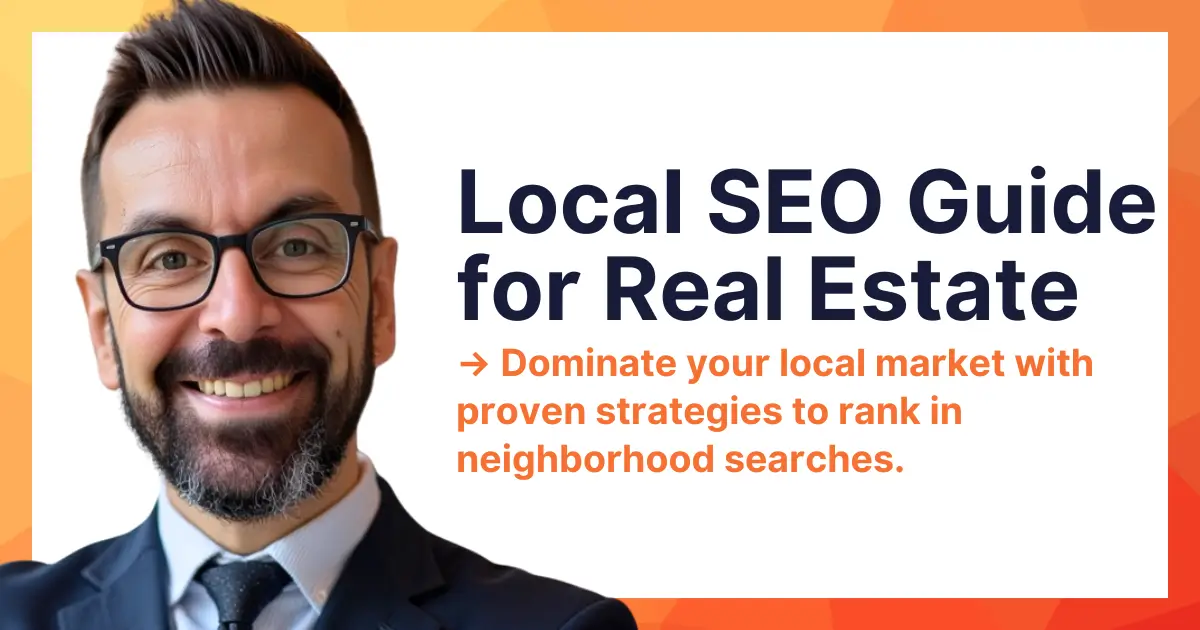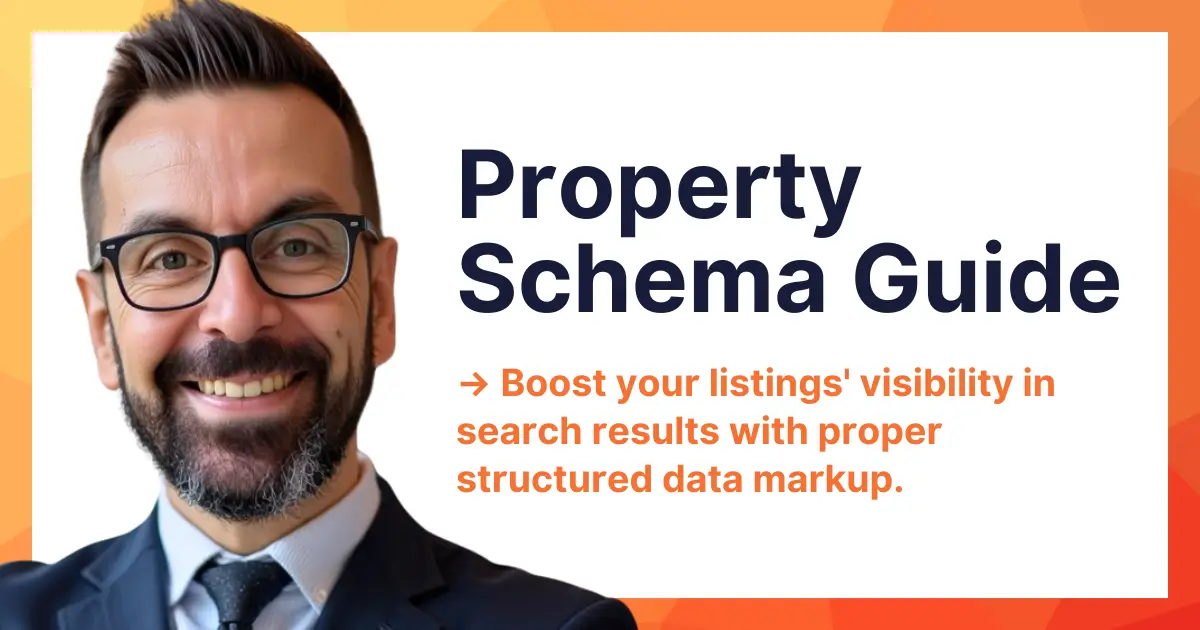Real estate has always been a competitive market, but thanks to the internet, it’s more crowded than ever. As a real estate SEO expert, I’m well placed to testify that buyers now spend WEEKS browsing properties, comparing prices, and reading up on agents online. Sellers are looking for top-notch professionals who can market their properties effectively and fetch the best possible offers.
In this guide, I’ll present a 17-point SEO checklist for real estate that’s both detailed and ready for action. You won’t just learn what to do: you’ll learn how to do it, complete with practical tools, specific steps, keywords, and examples. Think of it like a home inspection for your website. At the end of this article, you’ll have the know-how to whip your site into shape, rank higher in local searches, and connect with more serious buyers and sellers in your area.
Let’s get started!
Why SEO Matters So Much in Real Estate
Online searches now frequently replace in-person interactions, so real estate agents need more than just a good reputation to stand out. Local homebuyers are using the internet to find listings, research neighborhoods, and compare agents. Sellers are looking for trustworthy professionals who can market their properties effectively. If you haven’t invested in SEO or have only dabbled in it, you risk leaving money on the table and losing out on valuable leads.
The Role of Visibility
When potential buyers or sellers type a query like “homes for sale in [your city]” or “best real estate agent near me,” they’ll often choose from the first page of Google results. Getting to that top portion of the results page hinges on how well-optimized your site is for those target keywords. If your site doesn’t appear in the first few listings, the chances of attracting clicks drop drastically. Even the best real estate agent in town can remain virtually invisible if they can’t get their site to rank well.
Nurturing Trust and Credibility
Another major aspect of SEO in real estate is building trust and credibility with your audience. If your site appears consistently for relevant local searches, potential clients see it as a sign of your expertise and reliability. Search engines, in a way, endorse your website by placing it higher than others. This implied trust factor can encourage visitors to choose you over the competition.
Simply put, SEO is no longer a “nice-to-have” for real estate professionals—it’s an essential piece of a successful marketing strategy. Being visible where it matters, earning the trust of clients through consistent online presence, and driving quality leads are the best reasons to prioritize SEO.
The 17-Point Real Estate SEO Checklist
Below, you’ll find a structured, action-oriented SEO checklist specifically tailored to real estate professionals. Whether you’re an independent agent or working within a larger brokerage, these steps will help you stand out in a competitive digital landscape. Follow them in order or pick and choose based on your site’s current needs. Either way, you’ll be one step closer to dominating your local market.
1. Conduct In-Depth Keyword Research
If you’re just starting SEO, keyword research isn’t just about plugging in “real estate agent” and hoping for the best. It’s about deeply understanding your local market and the exact phrases people use when they search. This is the foundation of all your SEO efforts, so it pays to spend time here.
Action Steps
- Brainstorm root terms like “homes for sale in [your city]” or “condos in [your neighborhood].”
- Use tools (e.g., Google Keyword Planner, Ahrefs) to check search volume, keyword difficulty, and related queries.
- Identify “long-tail” keywords such as “luxury condo listings in downtown [city]” or “best real estate agent for first-time buyers in [area].”
Example
If you’re operating in Phoenix, you might uncover keywords like “family-friendly neighborhoods in Phoenix” or “Phoenix real estate market 2025.” These terms indicate buyers or sellers who are specifically looking for local insights—leading to more targeted traffic.
Why This is Useful
Your keyword list should guide both your site’s structure and your content strategy. Focusing on high-intent phrases helps you attract visitors who are already in the market for an agent or ready to make a real estate decision.
2. Map Keywords to Individual Pages
After finding your target keywords, the next step is to map them—one primary keyword (and a few related secondary keywords) per page. Think of each page as a unique “property” in your online portfolio, with its own theme and purpose.
Action Steps
- Assign each core keyword to a relevant page:
- “Sell a home in [city]” might align with your seller services page.
- “Condos for sale in [neighborhood]” could be for a dedicated listings page.
- Maintain a simple spreadsheet or document to track which pages target which keywords.
- Avoid duplicating the same keyword across multiple pages, which can cause “keyword cannibalization” and confuse search engines.
Example
If you have a page dedicated to “Luxury Homes in Scottsdale,” don’t also try to optimize it for “Family Homes in Scottsdale.” Each of these deserves its own page, with content tailored to those buyers’ specific needs.
Why This is Useful
Effective keyword mapping ensures clarity for both readers and search engines. When you give each page a distinct focus, you boost the chance that Google will serve up that page when someone searches for its specialized topic.
3. Optimize Your Title Tags and Meta Descriptions
Title tags and meta descriptions might seem small, but they have an outsized influence on your SEO. Think of them as the “for sale” sign on each page. A good one can attract clicks; a vague one might be passed over.
Action Steps
- Keep title tags around 50-60 characters and include your primary keyword near the beginning.
- Write meta descriptions around 150-160 characters. Entice readers with a compelling call to action or unique selling point.
- Include location-specific words (e.g., “Austin real estate expert”) to appeal to local searches.
Example
A well-optimized title could be:
- Title: “Luxury Homes in Scottsdale | Your Expert Scottsdale Realtor”
- Meta Description: “Explore exclusive luxury listings in Scottsdale. Get personalized guidance from a local expert with 20 years of real estate experience.”
Why This is Useful
Strong title tags and meta descriptions help you stand out in search results. If you include keywords and local identifiers, you make it crystal clear what your page offers and who it’s for.
4. Create Valuable, In-Depth Content
These days, Google doesn’t just rank sites that sprinkle a few keywords. It wants to see valuable, authoritative content that addresses the reader’s questions. This is your chance to shine as the friendly neighborhood expert who knows the market like the back of their hand.
Action Steps
- Write blog posts tackling questions like “What’s the best time to sell a home in [city]?” or “How to choose the right mortgage for first-time buyers.”
- Use data and personal stories to establish authority. If you have access to historical pricing data or can share a client success story, do so.
- Include relevant keywords naturally in your headings and subheadings.
Example
A 1,500-word post titled “The Ultimate Guide to Buying Your First Home in San Diego” could break down local mortgage rates, top neighborhoods, and hidden fees. It might include a case study of a young couple who found success following your tips.
Why This is Useful
High-quality content positions you as more than just an agent—it positions you as a local authority. Google notices when you consistently publish well-researched articles, and so do your prospective clients.
5. Create Location Pages & Neighborhood Guides
Location-based content is the backbone of real estate SEO. Buyers want to know what it’s actually like to live in a specific area, beyond square footage and property prices. Offering that local perspective can set you apart from national portals and listing aggregators.
Action Steps
- Create dedicated pages for each neighborhood you serve.
- Highlight local amenities, schools, commute times, and walkability.
- Embed interactive maps or custom videos showcasing the area’s appeal.
Example
If you target families, a dedicated page for “Family-Friendly Neighborhoods in Denver” could feature a short video tour of local parks and highlight a personal anecdote about one of your client’s experiences finding a home near a top-rated school.
Why This is Useful
Neighborhood guides add depth to your site and demonstrate an intimate knowledge of your market. This not only helps your SEO but also builds trust—people feel they’re getting the inside scoop from an expert who truly knows the community.
6. Implement Structured Data (Schema Markup)
Structured data may sound technical, but it’s basically a language that helps search engines better “read” and display your content. For real estate listings, this can mean showing property details, images, and prices directly in Google search results.
Action Steps
- Use Google’s Structured Data Markup Helper or a plugin (for WordPress, try “Schema – All In One Schema Rich Snippets”) to add real estate schema.
- Include relevant fields: property type, number of bedrooms, bathrooms, and pricing details.
- Test your markup using Google’s Rich Results Test tool.
Example
When someone searches “3-bedroom house in Miami,” your listing could appear with extra details like “3 Beds, 2 Baths, $500,000,” enticing users to click. This extra visibility can lead to higher click-through rates.
Why This is Useful
While it requires some technical setup, schema markup can give your listings a visual edge in the search results. Think of it as putting a spotlight on your properties—grab that attention and let the details shine.
7. Optimize Your Google Business Profile
Your Google Business Profile (formerly known as Google My Business) can be a goldmine for local real estate leads. Showcasing up-to-date information helps people find you quickly, see your reviews, and learn what sets you apart.
Action Steps
- Claim and verify your listing if you haven’t already.
- Keep your name, address, and phone (NAP) consistent with what’s on your website.
- Add photos or even short videos of your office or client success stories.
- Regularly post updates, such as new listings or market news.
Example
When potential clients in your city type “real estate agent near me,” your listing could appear in the map pack with a star rating, contact info, and a snapshot of recent posts or reviews.
Why This is Useful
A properly optimized Google Business Profile acts like a digital storefront. It boosts local visibility, builds immediate trust with star ratings, and encourages more direct contact from interested buyers and sellers.
8. Gather and Manage Online Reviews
Reviews aren’t just for restaurants. They’re integral to real estate, where clients rely heavily on recommendations and testimonials. Positive feedback on Google, Yelp, or Zillow signals that you’re reliable and delivers social proof that can sway on-the-fence prospects.
Action Steps
- Encourage satisfied clients to leave a review. Prompt them soon after closing, while the experience is fresh.
- Respond graciously to all reviews—positive or negative—to show you care about client satisfaction.
- Feature standout testimonials on your website, social media channels, or marketing materials.
Example
If you helped a family relocate from out of state, ask them to mention how you made the process smoother. Specific praise about your responsiveness and local knowledge can resonate with others in similar situations.
Why This is Useful
Good reviews provide a direct insight into what it’s like working with you. And because Google factors in overall ratings and engagement, actively managing your reviews can improve your local ranking and attract more leads.
9. Build High-Quality Backlinks
Introduction
Backlinks (links from other websites to yours) act like endorsements. The more reputable those endorsements, the stronger the message to search engines that your site is credible and authoritative. This is especially important in the competitive world of real estate.
Action Steps
- Pitch hyper-local stories or data to local news outlets—“Why Home Prices Are Rising in [Neighborhood].”
- Partner with complementary local businesses (e.g., mortgage brokers or interior designers) for cross-promotion.
- Write guest posts on real estate blogs or community websites.
Example
If you sponsor a community event or charity fundraiser, ask the organizers to link back to your website when they mention your name. These local ties can be far more valuable than random links from unrelated sites.
Why This is Useful
Earning relevant, high-quality backlinks cements your position as a trusted voice in real estate. While this step takes time and relationship-building, the payoff in credibility and search rankings can be substantial.
10. Focus on Page Speed and Site Performance
Imagine scheduling an in-person tour of a house that takes ages to open the front door. Online, slow page loading feels just as frustrating. Search engines also take load times seriously, often rewarding faster websites with higher rankings.
Action Steps
- Compress and resize images of listings before uploading.
- Use a caching plugin if you’re on WordPress (e.g., W3 Total Cache or WP Rocket).
- Check your site’s speed with Google PageSpeed Insights and aim for a score above 80.
Example
If you have a gallery of property photos, load smaller, optimized images by default, then allow users to click for a higher-resolution version. This cuts down on initial load times without sacrificing visual appeal.
Why This is Useful
A faster site leads to happier visitors and better SEO performance. With real estate being visual, balancing speed and high-quality images is key. A streamlined site can keep buyers and sellers clicking instead of bouncing.
11. Make Your Website Mobile-Friendly
More than half of all web traffic now comes from mobile devices. Picture someone scrolling through listings on their phone during a lunch break. If your site isn’t mobile-responsive, they’ll likely leave and never return.
Action Steps
- Choose a responsive design theme or template.
- Test how property images and videos display on smartphones and tablets.
- Keep navigation clean—limit the number of menu items and use large, tappable buttons.
Example
A mobile-friendly real estate site features big, easy-to-read property images, straightforward contact buttons (“Call Now!”), and short forms that don’t require typing a novel on a tiny keyboard.
Why This is Useful
Mobile optimization is essential for user experience and for ranking well in Google’s mobile-first index. You need to make sure your site loads quickly and looks great on smaller screens can directly boost lead generation.
12. Use Internal Linking Strategically
When you link from one page on your site to another, you help search engines understand your site’s structure. You also guide visitors toward relevant content or listings. Internal links act like the hallways in a well-designed home—providing a logical flow from room to room.
Action Steps
- Whenever you publish a new blog post, link to relevant neighborhood pages or listings.
- Use descriptive anchor text, like “Learn more about our Austin condo listings” instead of generic text like “Click here.”
- Update older blog posts with links to your new content to keep everything interconnected.
Example
If you wrote a post titled “Top 5 Home Staging Tips,” you could link each tip to a service page, a partner’s page (if it’s within your domain or you have a collaborations page), or a case study showcasing real before-and-after staging successes.
Why This is Useful
Smart internal linking makes your site easier to navigate and signals to search engines which pages hold the most value. It’s an often-overlooked tactic that can pay big dividends in user engagement and rankings.
13. Develop a Consistent Content Calendar
Staying relevant in the real estate scene often boils down to consistency. A content calendar helps you plan topics, schedule posts, and ensure you’re always providing fresh insights to potential buyers and sellers.
Action Steps
- Schedule weekly or bi-weekly posts on timely real estate topics (e.g., interest rate changes, local market reports).
- Mix up formats: blog posts, infographics, videos, and neighborhood spotlights.
- Track which topics get the most engagement, then prioritize similar themes moving forward.
Example
In January, you might write a piece titled “Preparing Your Home for the Spring Selling Season.” In August, a guide on “Making the Most of Summer Open Houses.” These posts tie naturally into the annual real estate cycle, making your content consistently useful year-round.
Why This is Useful
Having a well-structured calendar keeps your site fresh, encourages repeat visits, and helps you hit a wide range of relevant keywords. Over time, you’ll build a robust content library that solidifies your position as a local expert.
14. Start Using Video Marketing
Real estate is a visual industry. Why rely on static images alone when video can bring a property to life and give prospective buyers or sellers a more immersive experience?
Action Steps
- Film short property tours or “neighborhood walks” and embed them on your site.
- Host live Q&A sessions on platforms like Facebook or Instagram, then save and repurpose that content on your blog.
- Optimize video titles and descriptions with targeted keywords for YouTube or Vimeo SEO.
Example
A quick video tour of a cozy bungalow in a sought-after neighborhood can highlight the property’s charms more effectively than pictures alone. Tag it with keywords like “Charming bungalow in [city] video tour” to boost discoverability.
Why This is Useful
Video marketing is an impactful way to showcase your expertise and highlight the unique appeal of each listing. It also offers another avenue for SEO, as search engines increasingly prioritize video content in results.
15. Monitor User Behavior with Google Analytics & Search Console
It’s hard to fix what you don’t measure. Tools like Google Analytics and Google Search Console help you see how visitors interact with your site and where your traffic comes from. They also flag potential issues before they become big problems.
Action Steps
- Set up goal tracking—such as contact form submissions or phone calls—so you can see how many visitors convert into leads.
- Check the “Queries” report in Search Console to discover which keywords people use to find you.
- Keep an eye on pages with high bounce rates, as they might need better content or faster load times.
Example
If you notice an uptick in visits to “townhouse listings in Brooklyn,” you could double down on that interest by creating a detailed video tour of a popular townhouse or writing an in-depth blog post about what to expect when buying a townhouse in that area.
Why This is Useful
Data doesn’t lie. Consistently reviewing your analytics helps you refine your strategy, eliminate weak points, and seize new opportunities as they arise. This keeps your SEO dynamic and responsive to market changes.
16. Stay Active on Social Media for Community Engagement
Social media may not be a direct ranking factor, but the exposure and connections you gain can indirectly bolster your SEO. The more people engage with your content, the more likely it is to be shared or linked back to.
Action Steps
- Post behind-the-scenes glimpses of new listings on Instagram or TikTok.
- Share blog articles or neighborhood guides on Facebook and LinkedIn.
- Engage with local community groups, offering advice and insights without being overly promotional.
Example
You might post “Just listed! Check out the view from this 2-bedroom condo in downtown Chicago” on Instagram, and direct followers to your site for more details. Increased traffic and shares can boost the page’s search performance over time.
Why This is Useful
Effective social media use is about building relationships and trust. Offering real value and local expertise can help you broaden your reach, attract more site visits, and potentially earn valuable backlinks from community members who appreciate your insights.
17. Keep an Eye on Competitors—and Innovate
Finally, you don’t operate in a vacuum. Other agents and brokerages in your area are also jostling for those top Google spots. Monitoring your competitors can reveal gaps in your own strategy and spark new ideas.
Action Steps
- Look at competitors’ content. Which topics are they covering that you haven’t addressed yet?
- Analyze their backlink profiles (using tools like Ahrefs or Moz). Are there local directories or media outlets linking to them that you can also engage with?
- Find a unique angle—maybe your competitor has great city-wide coverage but offers little insight into family-friendly neighborhoods or rental market trends.
Example
If a competitor is dominating “luxury condos in Houston,” you might pivot to “luxury lofts in Houston” or “Houston penthouses” to carve out your own niche. This way, you differentiate yourself in the eyes of both search engines and clients.
Why This is Useful
Keeping a watchful eye on local competitors doesn’t mean copying them. Instead, find the “white space” where you can innovate, build on your strengths, and meet the specific needs of your audience. That’s the key to staying ahead in a crowded digital marketplace.
Final Thoughts: Bringing It All Together
You’ve just explored 17 detailed steps that can help transform your real estate website from an overlooked corner of the internet into a lead-generating powerhouse. Much like staging a home for a successful open house, each step in this checklist plays a crucial role in “staging” your online presence for maximum appeal.
Here’s the quick recap:
- Dig into keywords and map them to specific pages so there’s no overlap.
- Optimize technical details like title tags, meta descriptions, site speed, and mobile responsiveness.
- Invest in high-quality content—from neighborhood guides to video tours—and back it up with consistent internal and external linking.
- Lean into local SEO by refining your Google Business Profile, gathering reviews, and building a strong network of community backlinks.
- Monitor everything using Google Analytics and Search Console, keeping an eye on what’s working and what needs improvement.
- Stay flexible by tracking competitors and adjusting your strategy to new market realities.
SEO isn’t a one-and-done task. The real estate market changes, buyer preferences evolve, and Google’s algorithms get tweaked. Treat this checklist as a living document. Something you revisit and refine every quarter or whenever you sense shifts in your local market.
If you follow these 17 actionable steps, you’ll be well on your way to ranking higher in search results, connecting with more serious buyers and sellers, and ultimately, closing more deals. In my 10+ years of helping realtors succeed online, I’ve seen agents triple their lead flow simply by dedicating consistent time to SEO. With the right mix of patience, persistence, and passion for helping people find their perfect home, you can make your online presence just as impressive as your best listing.
You can also learn more with these articles:
- The Ultimate SEO Checklist (Semrush)
https://www.semrush.com/blog/seo-checklist/
Offers a comprehensive checklist that you can adapt to real estate-specific strategies. - Real Estate Marketing: The Ultimate Guide (HubSpot)
https://blog.hubspot.com/marketing/real-estate-marketing
A well-rounded guide covering digital marketing tactics and strategies for real estate. - SEO Starter Guide (Google Search Central)
https://developers.google.com/search/docs/fundamentals/seo-starter-guide
Google’s official starter guide—perfect to ensure you’re following best practices.














